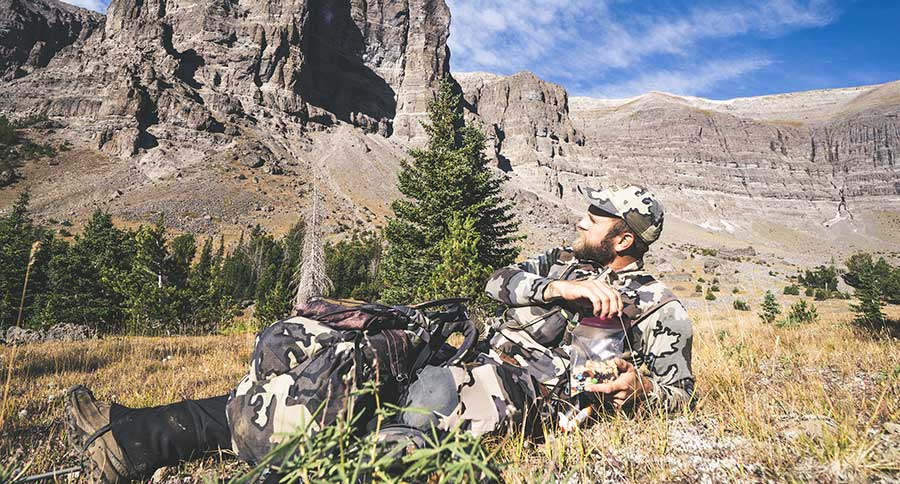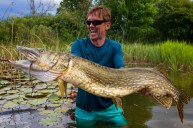How this new legislation should help recruit new hunters.
We talk a lot about hunter recruitment here in the United States. It is no secret. Things aren't great.
The number of hunting licenses being sold each year is going down as more and more people drop out of the sport.
That's not good news for wildlife conservation or providing our wildlife agencies with the proper funds they need to preserve our precious natural resources.
But some legislation that recently passed through the House of Representatives without much fanfare may help change that. It's the Modernizing the Pittman-Robertson Fund for Tomorrow's Needs Act.
We know that's a mouthful. But it's an important bill for conservation efforts and increasing the number of hunters in the woods. Let us break it all down for you.
What is the Pittman-Robertson Wildlife Restoration Act?
You may have never heard of the Pittman-Robertson Act (P-R) before, but we can almost guarantee you've contributed to it. It's a wildlife restoration act that was signed into law by Franklin Roosevelt in September 1937. Named for its Democratic sponsors, Key Pittman and Absalom Willis Robertson, the bill took the funds from an existing 11% federal excise tax on all firearms and ammunition and instead gave it to the Secretary of Interior.
In other words, don't let your wife tell you that buying new guns is a bad thing!
The P-R Act also gathers tax money on things like fishing tackle and boat fuel.
These funds are distributed by the Secretary of Interior to the states. In the past, they've gone towards things like purchasing new public lands, preserving habitat, conducting wildlife surveys, creating outdoor recreation programs and managing wildlife resources, all by state wildlife agencies.
The U.S. Fish and Wildlife Service has estimated that in the act's 83-year lifespan, it has raised nearly $2 billion in wildlife conservation funding. That's no small chunk of change!
Indirectly, the P-R Act is said to be a major factor in bringing back some species from their original habitat, and even the brink of extinction, like the whitetail deer or wild turkey. Can you imagine hunting season in America without either of those species? We surely can't.
Some of you might be a little concerned now that you're learning what this act is about. You may be wondering just what the word "modernizing" means. Not to worry, this latest revision is, by most accounts, a good thing.
What do they mean by "modernization"?
The P-R Act has been amended several times, but this latest change may be one of the most important yet.
Previously, the language of the act has been very specific in how state agencies can use the funds. It has mostly been limited to the items I discussed above, leaving many state fish and game agencies with their hands tied in other areas. There was a particularly small amount of resources dedicated to a lack of hunters and recreational shooters.
This new legislation, which was bipartisan, will now allow some of the excise taxes collected to go towards hunter safety programs, shooting sports recruitment and other hunter recruitment efforts. It will specifically help the things we've talked about, seen in the headlines, and covered relentlessly in the outdoor media space.
One big obstacle to hunting is general access to a good place to hunt. The new changes will also help fund hunter access programs that will give more people a place to do the things sportsmen like to do: hunt, fish, boat, hike, and camp.
It will also pump some new money into conservation grants to restore native areas in places like the Chesapeake Bay and Florida Everglades, which I think we can all agree are worth saving. It's still preserving funds for the things that it originally did best.
Why this is important
It is no secret that hunter numbers are in sharp decline. Plenty of hunters are like my father, one day they just hang up their guns and decide they are done. With tons of hunters aging out of the sport, there is a huge problem. Not enough hunters are taking up the sport to replace them.
The immediate trickle-down effect from declining hunting participation is obvious. Less money from hunting license sales to fund state agencies means less money to go into operation and maintenance of your favorite state park. The state might not have enough officers to patrol that favorite river for anglers, allowing poachers to commit more crimes. Small businesses are affected too as firearm and archery equipment sales go down and less people take up recreational shooting sports.
The other big problem is the concept of population control. We mean hunting for deer, elk, turkey and other wild animals. It doesn't help there's a lot of habitat destruction going on in this country as it is. If animals get more and more crowded in their natural areas, they start adapting to living in urban areas with humans. This causes plenty of other issues, like property damage, animal/vehicle accidents and the spread of animal diseases.
As you can see, it's a delicate system and a lot is hanging on hunter numbers funding the programs keeping it all together. That's why new hunter education programs are so important.
Will it work?
Well, big hunting organizations like Safari Club International seem to think it will work. "Modernizing Pittman-Robertson will allow funds generated by hunters to ensure that more Americans take to the field. Creating more hunters means creating more money for conservation," SCI Director of Government Affairs' Ben Cassidy said in a press release.
It's worth noting that the number of anglers nationwide has been growing annually. Nearly two million people picked up fishing between 2011 and 2016 alone. Some attribute that to a provision of the Sport Fish Restoration Act, aka: the Dingell-Johnson Act that authorized money for angler recruitment programs. The new legislation makes a similar provision for P-R.
One thing is for sure, we can't just sit and do nothing. Hunter numbers will continue to drop unless this problem is addressed. Many state wildlife agencies have had to slowly slash programs, repairs and land acquisitions for years. That's directly the result of less money from fewer hunters.
This new legislation to modernize the Pittman-Robertson Act may be the next best hope we have to save hunting here in the U.S. We'll anxiously be watching the results of this change to see if it sparks a new trend of hunters for the next generation!
For more outdoor content from Travis Smola, be sure to follow him on Twitter and check out his Geocaching and Outdoors with Travis Youtube channels.
NEXT: CONSERVATION IN PERIL AS HUNTER NUMBERS DECLINE
WATCH




